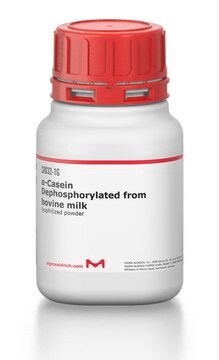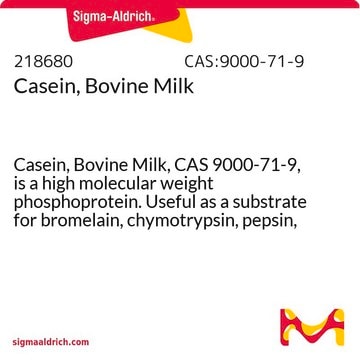Recommended Products
biological source
bovine milk
Quality Level
product line
BioUltra
assay
≥98% (PAGE)
form
essentially salt-free, lyophilized powder
technique(s)
activity assay: suitable
storage temp.
−20°C
InChI
1S/C81H125N22O39P/c1-36(2)31-50(76(132)94-43(15-24-57(87)108)71(127)101-52(34-64(120)121)78(134)98-49(81(137)138)11-7-8-30-82)99-72(128)47(19-28-61(114)115)95-77(133)51(33-63(118)119)100-73(129)48(20-29-62(116)117)97-80(136)65(37(3)104)103-75(131)44(16-25-58(88)109)92-68(124)42(14-23-56(86)107)90-67(123)41(13-22-55(85)106)91-69(125)45(17-26-59(110)111)93-70(126)46(18-27-60(112)113)96-79(135)53(35-142-143(139,140)141)102-74(130)40(12-21-54(84)105)89-66(122)39(83)32-38-9-5-4-6-10-38/h4-6,9-10,36-37,39-53,65,104H,7-8,11-35,82-83H2,1-3H3,(H2,84,105)(H2,85,106)(H2,86,107)(H2,87,108)(H2,88,109)(H,89,122)(H,90,123)(H,91,125)(H,92,124)(H,93,126)(H,94,132)(H,95,133)(H,96,135)(H,97,136)(H,98,134)(H,99,128)(H,100,129)(H,101,127)(H,102,130)(H,103,131)(H,110,111)(H,112,113)(H,114,115)(H,116,117)(H,118,119)(H,120,121)(H,137,138)(H2,139,140,141)
InChI key
BECPQYXYKAMYBN-UHFFFAOYSA-N
Gene Information
bovine ... CSN2(281099) , CSN3(281728)
Looking for similar products? Visit Product Comparison Guide
General description
Application
Biochem/physiol Actions
Storage Class
11 - Combustible Solids
wgk_germany
WGK 1
ppe
Eyeshields, Gloves, type N95 (US)
Certificates of Analysis (COA)
Search for Certificates of Analysis (COA) by entering the products Lot/Batch Number. Lot and Batch Numbers can be found on a product’s label following the words ‘Lot’ or ‘Batch’.
Already Own This Product?
Find documentation for the products that you have recently purchased in the Document Library.
Customers Also Viewed
Our team of scientists has experience in all areas of research including Life Science, Material Science, Chemical Synthesis, Chromatography, Analytical and many others.
Contact Technical Service











